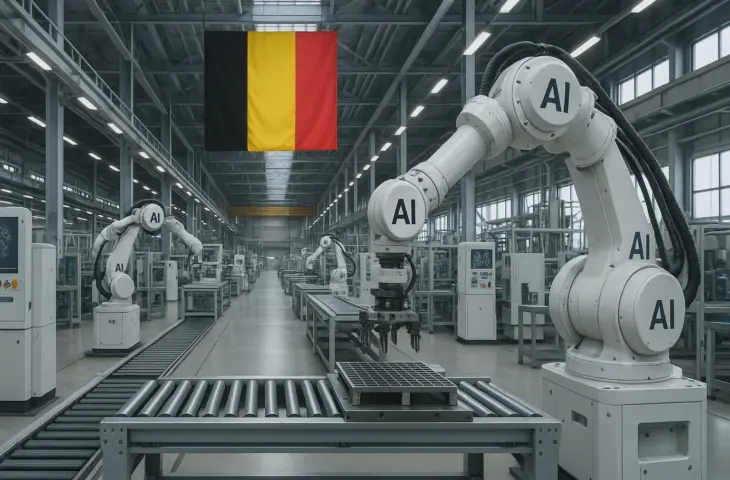Don’t call Belgium a laggard in AI adoption. The assets are present to be a leader in Europe. AI factories can play a significant role in this.
“We may have the reputation of being followers, but if you look at the numbers, we’re not doing so badly,” says Koen Segers, Managing Director for Dell in Belgium, bluntly. Belgian modesty proves to be misplaced when it comes to AI adoption.
The FPS Economy recently published a report showing that Belgium is a European leader in AI usage by companies. 24 percent of Belgian companies today use “at least one form of artificial intelligence”. The podium place is confirmed by Eurostat: only Denmark (27%) and Sweden (25%) score higher.
read also
Digital Divide in Belgium: Large Companies Lead the Way, SMEs Lag Behind
“Both private and public organizations are evolving rapidly. We are now entering the phase of ‘enterprise AI’ where companies use it for business scenarios. For many organizations, it started with typical use cases, such as using Copilot for personal productivity, but it is quickly expanding to very business-specific implementations.”
Big or Small
According to Segers, Belgium’s perceived underdog position stems partly from the fact that we (still) don’t have large-scale AI data centers. “But that’s not necessary at all. There’s a misconception that AI inherently requires investments in “massive server farms”. Use cases can just as well be small-scale and run on your laptop.”
In practice, however, it’s not all that simple. Gartner predicts that forty percent of AI projects will be abandoned within two years due to lack of return. Many solutions sold under the trendy term AI agents are actually older products that add little new.
“The right solution starts from usage”, Segers hits the nail on the head. “Companies can be successful with experimenting, but if the use case is not sufficiently defined, it won’t work in practice. Then you need to see if your data is accessible. In many organizations, data is scattered. Careful data management is therefore very important”.
“A third factor where companies often go wrong is skills. In a global survey by Dell, almost one hundred percent of companies indicate they need additional skills. How the infrastructure will look doesn’t need to be your first thought; the supplier helps with that”, says Segers.
Back to On-Prem
Today, a fourth concern is added. “Sovereignty is on every CIO’s agenda,” says Segers without hesitation. “This is accelerated by AI because you want to use confidential data. There is a renewed demand for on-prem solutions in the market.”
read also
The Cloud Illegal? Sovereignty as Holy Grail for European IT
The trend that the days of “cloud-first” are slowly numbered is not only confirmed by Dell, but a server manufacturer naturally likes to see it happen. “The public cloud is being ‘put on hold’ again for own data centers or private cloud infrastructure. Proof of concepts around AI often still start in the public cloud, but for actual implementation, people often return to on-prem. That’s where most business data ultimately resides”.
Dell can cleverly capitalize on this. “The infrastructure that the customer buys from us belongs to the customer. The data remains their property by definition. We believe that AI should come to the data, not the other way around.”
Belgian AI Factories
The red carpet is rolled out for AI factories. As a loyal partner of Nvidia, Dell (not as only server provider) eagerly participates in Jensen Huang’s construction plans. But what should we actually imagine an “AI factory” to be? We pose the question to Segers.
“You should see it as an infrastructure layer that connects a project to the appropriate AI model. Data is the raw material you put into the factory, and the output is the result of a use case. AI factories are mistakenly reduced to GPUs, as it’s an open ecosystem with multiple links. The demand for mainstream servers is not significantly increasing, but for accelerators, we do see increased traction.”
Available building land is rather scarce in Belgium, and that threatens to be no different for AI factories. “Investments in data centers can provide the necessary capacity. In this context, I can only applaud the government’s initiative to bring AI factories to Belgium. This will strengthen Belgium’s position to attract large international players and increase adoption volume by Belgian companies”.
High Stakes
For organizations looking to set up an AI factory, Dell is eager to be the contractor. “Dell has made AI its big bet. Our focus is on the infrastructure layer, and beyond that, we leave the choice to you. AI should be approached from an open ecosystem; otherwise, you’ll quickly find yourself stuck,” concludes Segers.
It’s a misconception that AI requires massive “server farms”. That’s not necessary at all.
Koen Segers, Managing Director Dell Belgium
